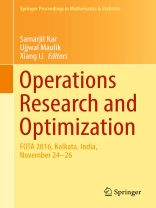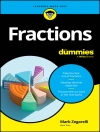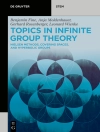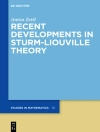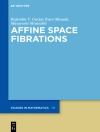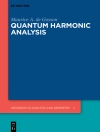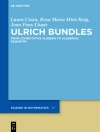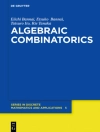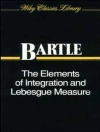This book discusses recent developments in the vast domain of optimization. Featuring papers presented at the 1st International Conference on Frontiers in Optimization: Theory and Applications (FOTA 2016), held at the Heritage Institute of Technology, Kolkata, on 24–26 December 2016, it opens new avenues of research in all topics related to optimization, such as linear and nonlinear optimization; combinatorial-, stochastic-, dynamic-, fuzzy-, and uncertain optimization; optimal control theory; as well as multi-objective, evolutionary and convex optimization and their applications in intelligent information and technology, systems science, knowledge management, information and communication, supply chain and inventory control, scheduling, networks, transportation and logistics and finance. The book is a valuable resource for researchers, scientists and engineers from both academia and industry.
विषयसूची
Monalisa Mandal, Anirban Mukhopadhyay and Ujjwal Maulik, A Genetic Algorithm-based Clustering Approach for Selecting Non-redundant Micro-RNA Markers from Microarray Expression Data.- Nan-Bin Cao and Yu-Ping Zhang, The General Solutions to Some Systems of Adjointable Operator Equations.- Kaushik Das Sharma, Amitava Chatterjee, Patrick Siarry and Anjan Rakshit, CMA-H∞ Hybrid Design of Robust Stable Adaptive Fuzzy Controllers for Non-Linear Systems.- Hongfang Bai and Rui Xu, Global Stability of a Delayed Eco-epidemiological Model with Holling Type-III Functional Response.- Jyotirmoy Sarkar, Score-Based Secretary Problem.- Monalisa Pal, Amr Alzouhri Alya, Sanghamitra Bandyopadhyay, Stephane Ploix and Patrick Reignier, Enhancing Comfort of Occupants in Energy Buildings.- Tatsua Oyama, Applying OR Theory and Techniques to Social Systems Analysis.- A.D. Banik, Souvik Ghosh and Debasis Basu, Computational Analysis of a Single Server Queue with Batch Markovian Arrival and Exponential Single Working Vacation.- Gopinath Panda, A.D. Banik and M.L. Chaudhry, Computational Analysis of the GI/G/1 Risk Process using Roots.- Banerjee, Ant Lion Optimization: A Novel Algorithm Applied to Load Frequency Control Problem in Power System.- Suvasis Nayak and A.K. Ojha, A Solution Approach to Multi-level Nonlinear Fractional Programming Problem.- D. Sadhukhan, B. Mondal and M. Maiti, Bio-economic Prey-predstor Fishery Model with Intratrophic Predation, Time-delay in Reserved and Unreserved Area.- A.K. Das, R. Jana and Deepmala, On Generalized Positive Subdefinite Matrices and Interior Point Algorithm.- Totan Garai, Dipankar Chakraborty and Tapan Kumar Roy, A Multi-item Inventory Model with Fuzzy Rough Coefficients via Fuzzy Rough Expectation. Shantanu Jana, Nibaran Das, Ram Sarkar and Mita Nasipuri, Recognition System to Separate Text and Graphics from Indian Newspaper .- Yadvendra Singh and S. K. Mishra, Saddle Point Criteria for Semi-infinite Programming Problems via an h -Approximation Method.- A. Banerjee, K. Sidkar and G.K. Gupta, On Finite Buffer BMAP/G/1 Queue with Queue Length Dependent Service.- Deepa Naik, Himansu Rathi, Asish Dhara and Tanmay De, Ageing and Priority Based Scheduling for Uplink in Wi MAX Networks.- Bindu Kaushal and Shalini Arora, Fixed Charge Bulk Transportation Problem.- Himanshu Shrivastava, Pankaj Dutta, Mohan Krishnamoorthy and Pravin Suryawanshi, Designing a Resilient Supply Chain Network for Perishable Products with Random Disruptions.- Anupama Chanda, R.N. Mukherjee and Bijan Sarkar, Performance Evaluation of Management Faculty using Hybrid Model of Logic-AHP.- Oshmita Dey and Anindita Mukherjee, An Integrated Imperfect Production-Inventory Model with Lot-Size Dependent Lead-Time and Quality Control.- Kajal Chatterjee, Edmundas Kazimieras Zavadskas, Jagannath Roy and Samarjit Kar, Performance Evaluation of Green Supply Chain Management using the Grey DEMATEL-ARAS model.- Dipanjana Sengupta and Uttam Kumar Bera, Reduction of Type-2 Lognormal Uncertain Variable and Its Application to a Two-stage Solid Transportation Problem.- Naorem Nalini Devi, Khundrakpam Johnson Singh and Tanmay De, ICMP-DDo S Attack Detection using Clustering-Based Neural Networks Techniques.- Arindam Roy, Goutam Chakraborty, Indadul Khan, Samir Maity, Manoranjan Maiti, A Hybrid Heuristic for Restricted 4-Dimensional TSP (r-4DTSP).
लेखक के बारे में
SAMARJIT KAR is an associate professor at the Department of Mathematics, National Institute of Technology, Durgapur, India. He completed his Ph D in Mathematics at Vidyasagar University, West Bengal. With over 15 years of experience in teaching, Professor Kar is also a visiting professor at the Department of Mathematical Sciences, Tsinghua University, China. He has co-authored more than 120 research articles in international journals, contributed volumes and conference proceedings, authored 2 textbooks and edited of 5 contributed books. He is the associate editor of the
Journal of Uncertainty Analysis and Applications (Springer) and is presently associated with an ongoing project, “Hybrid modelling of uncertainty analysis in environmental risk assessments” under the Board of Research in Nuclear Sciences (BRNS), Department of Atomic Energy (DAE), Government of India. His research interests include operations and optimisation, soft computing, uncertainty theory and financial modelling.
UJJWAL MAULIK has been a professor and head of the Department of Computer Science and Engineering at Jadavpur University, Kolkata, India, since 2004. He is also a visiting professor at the International Center for Theoretical Physics (ICTP), Italy. He received his Ph D degree in Computer Science and Engineering from Jadavpur University, Kolkata, India. He also chaired the Department of Computer Science and Technology at Kalyani Government Engineering College, West Bengal, India, from 1996 to 1999. Professor Maulik is the coauthor of seven books and more than 300 research publications. He was the recipient of the Government of India BOYSCAST Fellowship in 2001, the Alexander von Humboldt Fellowship for Experienced Researchers, in 2010, 2011 and 2012, and senior associate of the International Centre for Theoretical Physics (ICTP), Italy, in 2012. He is a founder member of the IEEE Computational Intelligence Society (CIS) and has held several positions at the Society, such as secretary, treasurer, vice chair and chair. He is a fellow of the Indian National Academy of Engineering (INAE), West Bengal Academy of Science and Technology (WAST), Institution of Electronics and Telecommunication Engineers (IETE), Institution of Engineers (India) (AMIE) and senior member of The Institute of Electrical and Electronics Engineers (IEEE). His research interests include computational intelligence, computational biology, combinatorial optimization, pattern recognition, data mining and social network.
XIANG LI is a professor at Beijing University of Chemical Technology, China. He received his Ph D degree in Operations Research and Control from Tsinghua University, China. He has authored one book and more than 60 articles in international journals including Transportation Research, Part B,
Transportation Research, Part C,
Information Sciences, the
European Journal of Operational Research, IEEE Transactions on Intelligent Transportation Systems, IEEE Transactions on Fuzzy Systems, IEEE Transactions on Systems, Man, and Cybernetics, Part A, which have been cited more than 700 times on the Web of Science and 1300 times on Google Scholar. He served as associate editor of
Information Sciences, Transportmetrica B: Transport Dynamics and is on the editorial board of the
International Journal of General Systems.
